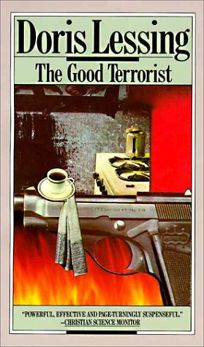Why does someone become a terrorist? I think we're allergic to a question like that, even in the post -9/11 era, perhaps especially in that era. It's easy to compartmentalize political violence away as a kind of evil that springs from evil, but harder to face the truth that those who commit terrorism think they're doing the right thing. They're wrong, of course, but what difference could we make if we were more willing to understand that frame of mind? And how might it make us rethink the kinds of violence we consider necessary or salubrious?
One thing that Doris Lessing's The Good Terrorist, about an English communist named Alice who assists in a bombing by her commune, makes clear is that the decision to commit political violence is rarely made from ideological convictions alone. There are interpersonal pressures that push toward violence, just as there are those that pull away from them, but they only work when there's a kernel of belief that the act is good. The Good Terrorist is a study in how our convictions intersect with our more personal, human needs, to create violence that might otherwise seem unthinkable.
Alice is not really ideological. Her understanding of Marx is muddy and her grasp of radical feminism considered scandalous. Her mode of communism is, at least at first, about building, not destroying. She and her boyfriend (or maybe it's just a crush?) Jasper move into a "squat," an abandoned building run by the Council Estate (like a housing project) occupied by the indigent, drifters, and by Communist types who have checked out of capitalist society. There's no heat or water. The squat is a mess. The Council has filled the toilets with concrete, so the upstairs is full of buckets of urine and feces. Alice makes it her mission, as she has apparently done in the past, to rehabilitate the house: burying the feces, cleaning the house, fixing it, convincing the Water people to turn on the water and the Council to approve their habitation. All of it requires money, which she begs for from family, then steals. Slowly it becomes a livable place again.
But that's not what everyone wants. Some inhabitants of the house refuse the improvements, claiming that they have chosen anonymity and squalor. Jasper and another member of the house, Bert, think that Alice's home improvement project is more or less a distraction from the "Cause," even though their overtures to become a political cell for the IRA, and then the KGB, have been rejected. "The Cause suffers," Jasper tells her, "while you play house and gardens." Only when the house and the inhabitants begin to fall apart--undone by petty infighting, police harassment, Council indifference--does violence seem like a possible path for Alice, an apt expression of anger and hopelessness.
Alice is deluded. She's quick to understand other people, and get what she wants from them, but she has no understanding of the way her own political self comes out of her cruel rejection of her bourgeoisie parents, whom she torments. Her love for the cruel and foolish Jasper is self-annihilating. But she, unlike her fellow comrades, has a spark of human empathy for the marginalized:
She was thinking that this is what happened to marginal people, people clinging on but only just. They made one slip; something apparently quite slight happened, like the Greek, but it was part of some downward curve in a life, and that was that--they lost their hold and fell.
And yet it's awfully easy, when the time comes, to redirect all her energy for building into a capacity for destruction. The final scene of the bombing, which goes more or less awry, is deflated by the blank stylelessness of Lessing's prose, which can make the book seem, at times, monotonous. But the novel's great strength is its understanding of the revolutionary psyche, how it's formed and operates. Lessing understands how our best instincts can be transformed, twisted into our worst ones.


No comments:
Post a Comment